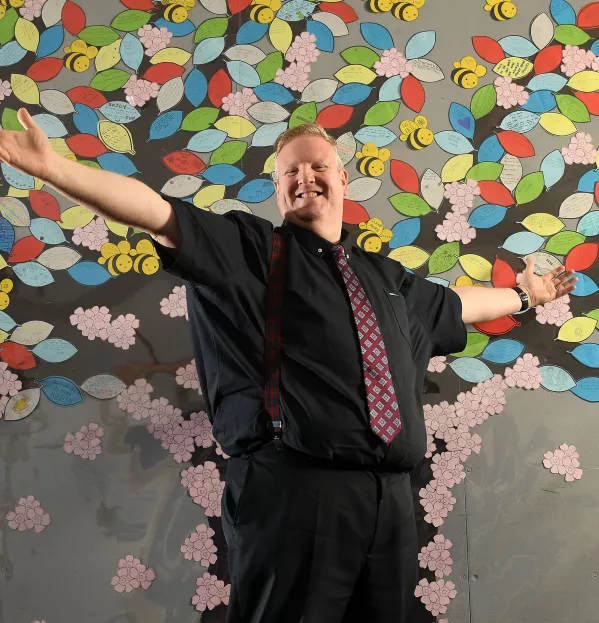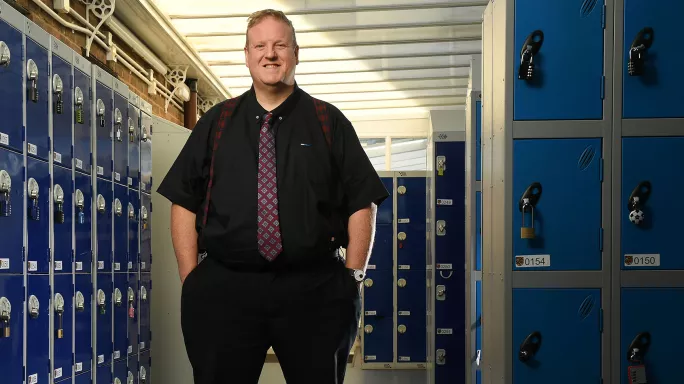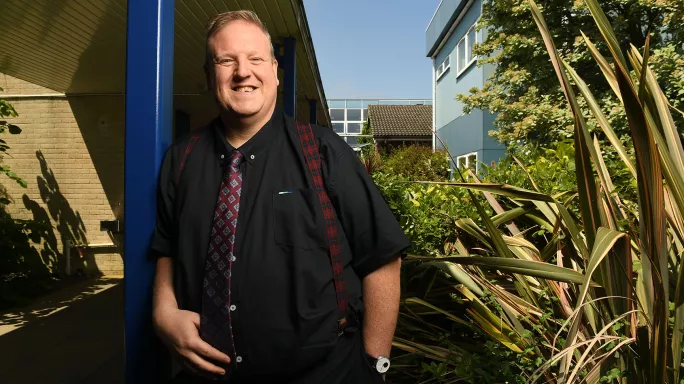- Home
- Leadership
- Strategy
- 10 questions with... Stuart Gardner
10 questions with... Stuart Gardner

Stuart Gardner is the CEO of the Thinking Schools Academies Trust (TSAT), a multi-academy trust formed of 20 schools across the south of England, from Deal on the Kent coast to Plymouth in South Devon.
He chatted to Tes for our 10 questions series to recall his own time at school - including barricading the classroom and sending a list of demands to the headteachers - and the painful lessons that helped him realise he had to get a better work-life balance, both for himself and to model to his staff.
He also explains why he’s not convinced our current curriculum truly prepares children for the future that awaits and why the trust sector has much to learn about building - and then maintaining - success at scale.
1. Who was your most memorable teacher and why?
My most memorable teacher was my history teacher in sixth form, Dr McLaughlin, because he made it so interesting.
We were doing the French Revolution as one of the first lessons in our A level and we barricaded the door and sent our list of demands to the headteacher. I’ve always taken to that kind of engagement and wanted to sprinkle it into my own practice when I was teaching because that’s when children learn most - that probably influenced me the most in my career.
2. What were the best and worst things about your time at school?
The people were the best and the worst.
I’ve still got friends from primary school and secondary school - it’s very hard to replicate a relationship with that amount of history and when you see each other, the time apart just disappears you spend so much time together…I feel really lucky to still have those friends in my life.
But on the flip side of that, not everyone is your mate, especially in secondary school. I’ve always been a big guy so nicknames and the things that went with that…I still look back and shudder.
3. Why do you work in education?
My mum was a teacher so I was aware of teaching and the career that went with that. I knew at the end of university that I didn’t want to go and work in an office, so education seemed a good starting point.
I’d gone to private school and I assumed I would probably teach in a private school but in the December of my postgraduate certificate in education, people started applying for jobs and someone applied to grammar school, so I did too, and I got the job.
I loved it, absolutely loved it - I loved working with children, I loved the classroom, the sense of pupils learning and building relationships with them.
4. What are you proudest of in your career?
In 2019 I had just become trust leader and one of our schools was having some real challenges with Year 6 pupils, so I went [to the school] and spent about five or six months working with their Years 6s for about half a day, every day and that was an amazing experience.
I’ve never worked closely with primary school children before but I absolutely loved it - their access to awe and wonder is a real joy to be around.

I learned an enormous amount about primary schools, too - language acquisition, reading and writing and maths, and all those fundamentals that if you’re going to engage in the modern world, you need to have those in place.
They got the best results they had ever had and going in there from a secondary school perspective and having an impact, and then my ability to lead a mixed trust and really understand what’s going on in those schools, I was proud of that.
5. And what do you regret?
I haven’t got the balance right between my career, my family and my health - I prioritised work for too long…for example, my son was born on a Saturday morning, and I was back at work on Monday and that was just a terrible decision - and it was my wife’s birthday, which I forgot!
A few years ago, I slipped a disc and I couldn’t lie down for weeks but I could just about move one finger. I had my laptop open and I had this completely misguided idea I was invaluable and [the trust] couldn’t possibly exist without me.
I’ve grown up from that now as I realised that if we were in a place where I’m agonising pain, but my finger on a laptop is going to make the difference, I haven’t done a very good job.
We need to model that for all our staff, too - they are phenomenally dedicated, and they go above and beyond, but I can’t let that be the expectation because I don’t expect that.
I want all our staff to have that work-life balance; I want them to be there for their family. When I was a headteacher and any colleagues had children, my first piece of advice was take your parental leave, you don’t want to miss that or get that wrong.
6. What are the best aspects of our school system?
We have amazing teachers and support staff and we do not celebrate that anywhere near enough.
We underestimate the quality of pedagogy in our classrooms. I don’t see many other countries with pedagogy of the standard you see in a classroom in England.
The other thing is schools are as supportive of each other as they’ve ever been in terms of looking out for each other and being together.
7. And what about the worst?
The worst thing is the disconnect between what happens in school and the real world that we’re supposed to be preparing our children for in the 21st century.
If you took a step back - what do we want our young people to be able to do at 18 to be successful in the modern world? I’m pretty sure you wouldn’t start with they must do history, geography, science, maths, English, art…a litany of subjects that cram the curriculum.
I’m pretty sure you would say you want them to be able to communicate well, listen to another person’s opinion without becoming angry, have intelligent discourse and be part of a team…all those soft skills we know are critical to long-term development.
And then, when you start thinking about what employers really want, they want people who turn up on time, who are polite to customers, who can write an effective letter and so on. So there is a massive list of things we will get to before: “How is an oxbow lake formed?” Or: “Can you draw a cell?”

Yes, there is a group of young people who absolutely want an academic education, because they will do amazing things around inventing cures for cancer but that is not for most people.
But we’re trapped in this idea that every child is entitled to an English Baccalaureate curriculum. Okay, but what do we as a society need? Which part of that curriculum truthfully equips them for 21st-century life?
8. If you became education secretary tomorrow, what would be the first thing you do?
I would set up a cross-party group and I would want to depoliticise education, and then ask that fundamental question about what we want our education system to look like.
Let’s not be trapped by an education system going back to the Second World War or a system that even predates that. Let’s ask, if that was not there, what would we set out to create?
The group would make those recommendations from the top down and on a timeline for change that was non-political, so no matter which party is in power, we would have a vision and a timeline so we can look in the mirror and say we’re doing the best for our children.
9. Who has made the biggest difference in education in the last 12 months?
I would say Amanda Spielman and Ofsted. In reality, the regulator has the greatest power and influence on our schools of any authority because what Ofsted mandates - and I realise they say they don’t mandate things - schools have to interpret this.
Lots of schools used to do three years of key stage 4, but very few do that now. In primary schools, the vast majority did topic-based learning - most have moved towards teaching subjects really clearly because that is what the expectation is.
That Ofsted framework fundamentally defines school practice in a way I don’t think is fully understood by politicians or the inspectorate itself.
What we’ve seen over the last few years is the system coming to understand what this means for schools…that’s been a massive shift.
10. What are the most important lessons you’ve learned from doing this job?
We as an organisation have been really successful because we’ve had great people doing a great job.
So the really clear lesson is great people make great schools and great people make great trusts, so nurturing and growing and developing your people is absolutely key. But the job I do now is very different from the one I’d started doing.
Sir David Carter has talked about inflection points for trusts as they grow and I completely agree with that but I don’t think there’s been anywhere near enough thought and research into understanding where those inflection points are and the extent of the change required to navigate them.
This is especially true in terms of growing the leaders you need to remain successful because, as a system, we’ve got better at having really good people having an impact over multiple sites.
But now you’ve got trusts of a size where you’ve got to go beyond that into processes and how those processes work in a structure that hasn’t had them at this scale.
Because previously to academies you had a local authority and the bottom line is those schools pretty much ran independently of their local authority, unless it was a real crisis, so there wasn’t a system of processes going on there.
Then we had academies that were largely small-scale in basis, so probably got away without that.
But now, as the academy groups grow, the challenge is how to make systems and processes effective to support those schools to be really effective in financially meaningful groups. So, what I have really learned is education at scale is more complicated than we probably thought it was.
Stuart Gardner was talking to Dan Worth
You need a Tes subscription to read this article
Subscribe now to read this article and get other subscriber-only content:
- Unlimited access to all Tes magazine content
- Exclusive subscriber-only stories
- Award-winning email newsletters
Already a subscriber? Log in
You need a subscription to read this article
Subscribe now to read this article and get other subscriber-only content, including:
- Unlimited access to all Tes magazine content
- Exclusive subscriber-only stories
- Award-winning email newsletters



